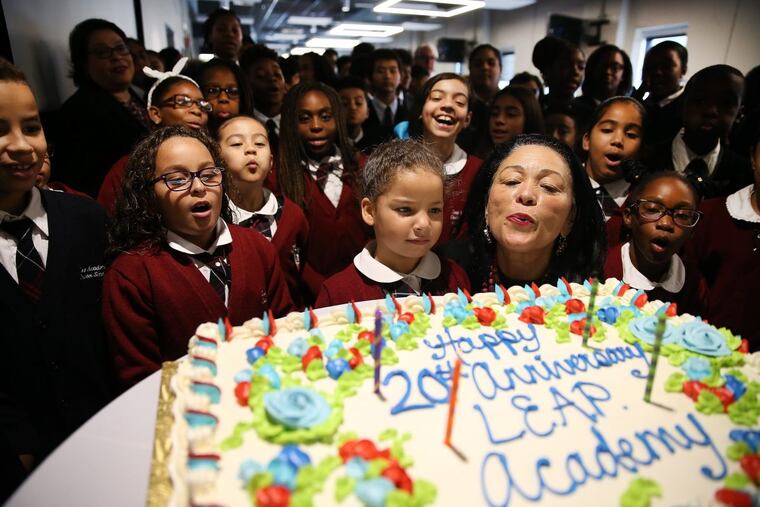Camden's first charter school, LEAP Academy, marks 20th year
While charter schools have drawn critics, Camden Education Association President Keith Benson praises LEAP.

When Gloria Bonilla-Santiago decided in the early 1990s to open a charter school in Camden, she faced an uphill battle.
The laws did not permit charter schools back then.
So she spent years designing a plan, joined others in lobbying for a state charter school law, and helped raise millions to make it happen. In 1997, she launched her dream: LEAP Academy University Charter School welcomed its first students in September 1997 in classes held in 19 modular trailers on a once abandoned parking lot in North Camden.
On Tuesday, Bonilla-Santiago burst with pride as LEAP celebrated its 20th anniversary at a gathering downtown. With 1,500 students in grades pre-K through 12, it is one of the largest charter schools in New Jersey and has changed the educational landscape in Camden with its six campuses on Cooper Street.
"Sometimes you have to just think big," Bonilla-Santiago told a crowd of about 100. "You have to believe it."
When it opened, LEAP was among the first 17 charter schools that started in the state after then-Gov. Christine Todd Whitman signed charter school legislation. Today, there are 89 charter schools statewide that enroll more than 56,400 students for the 2017-2018 school year.
In Camden, there are now nearly 20 charter and Renaissance schools, which like charters also are publicly funded but privately operated. These schools are alternatives to the city's failing public school system, which since 2013 is operating under a state takeover. About 6,500 students attend the district's traditional public schools while nearly 9,000 attend charters and Renaissance schools.
"It's a whole different level compared to Camden schools," said Mike McCray, 15, a junior, who enrolled in LEAP as a kindergartner in 2007 and has friends who attend traditional public schools. "I'm grateful for everything here."
Many credit Bonilla-Santiago for paving the way to offer an option to public school children. Charter schools are not overseen by the local school district and are allowed greater freedom to experiment.
"The bad schools that are not educating our kids — we should close them down," said Ronald Rice, senior director of Government Relations for the National Alliance for Public Charter Schools.
Nationally, more than 3.1 million students are enrolled in 6,800 charter schools, Rice said. Charter school laws have been adopted by 44 states, including Pennsylvania.
But critics say charter schools drain funds and bright students from public schools. The NAACP has called for a national moratorium. Some charter-school students have performed worse on standardized tests than their public-school counterparts. Last spring, the state Department of Education refused to renew the charter for Camden Community Charter, citing poor performance on state standardized tests.
Susan Cauldwell, of Save Our Schools NJ, a parent advocacy group, said too many charter schools fail to reflect the communities they serve. The group has called for more accountability for charter schools, more scrutiny during the renewal process, and a separate funding source.
"They tend to skim kids," Cauldwell said in an interview Tuesday.
This summer, Camden school Superintendent Paymon Rouhanifard accused LEAP of unfair enrollment practices, alleging that the staff of LEAP discourages some parents from enrolling their children, while urging others to lie on applications in order to increase their child's chances of being selected. The allegation, which LEAP denied, came after the school earlier this year successfully asked the state for permission to withdraw from Camden's citywide enrollment system. That program, launched in 2015, allows parents to apply to any school in the city by using one application.
Controversy has touched Bonilla-Santiago, too. In 2013, she drew criticism after the school's board awarded a large raise to her boyfriend, who is also executive chef at LEAP. The board said she had recused herself from that decision.
Camden Education Association President Keith Benson — a critic of Renaissance schools because they simply replaced existing public schools — praised LEAP, however, as a viable alternative for some students. "I'm not going to say our schools are better than LEAP and disparage LEAP. It offered parents something different. If the parents and the students got what they were looking for, more power to them."
At a symposium Tuesday, Bonilla-Santiago, school officials, and students touted the school's accomplishments. LEAP, which stands for Leadership, Education and Partnership, is affiliated with Rutgers-Camden, where Bonilla-Santiago is a distinguished professor.
Since graduating its first class in 2005, LEAP says it has placed 100 percent of its graduating seniors in college. When the state took control of the public schools in 2013, the district's traditional schools had a 49 percent graduation rate. That has since improved to 70 percent.
"Not only were we challenged, we were encouraged," said alum Melissa Edmond, 25, who is completing a three-year program to obtain a doctorate in pharmacy at South University in Savannah, Ga. She and five others will become the first inductees into the LEAP Alumni Hall of Fame in December.
Under a new program added this year, LEAP students can earn up to 30 college credits at Rutgers-Camden and Rowan University while finishing their senior year. The entire senior class of 120 is enrolled in college classes.
LEAP began with 324 students in K-5, with a grade level added each year for three years, then adding the high school. The charter school emphasizes science, math, and technology. LEAP says its students have a longer school day, from 8 a.m. to 5 p.m., and an 11-month academic calendar.
The school eventually acquired a permanent location at Seventh and Cooper Streets. When LEAP added a high school, it was the first new school built in Camden in 30 years.
Students are selected by lottery. Currently, more than 1,800 students are on a waiting list.
"We have done the impossible," Bonilla-Santiago said.